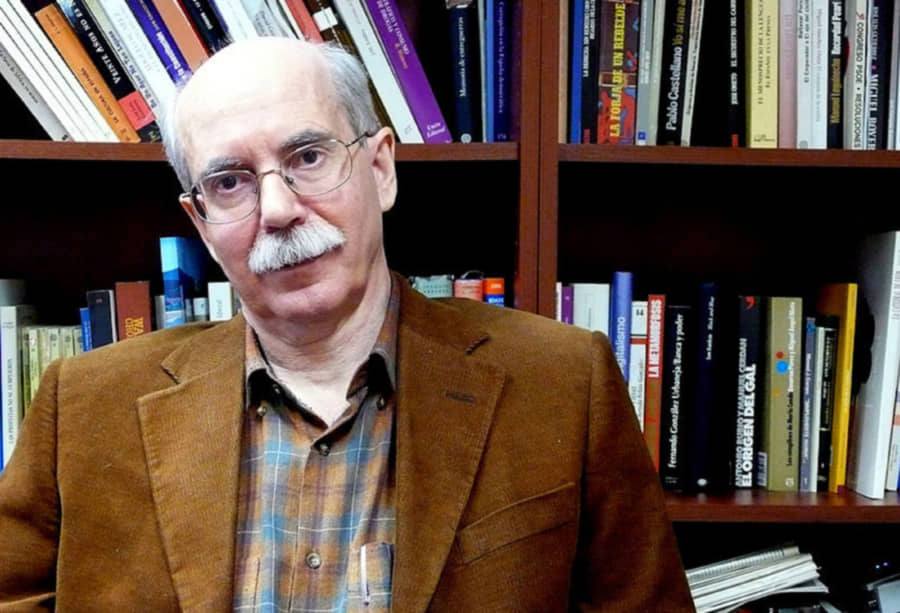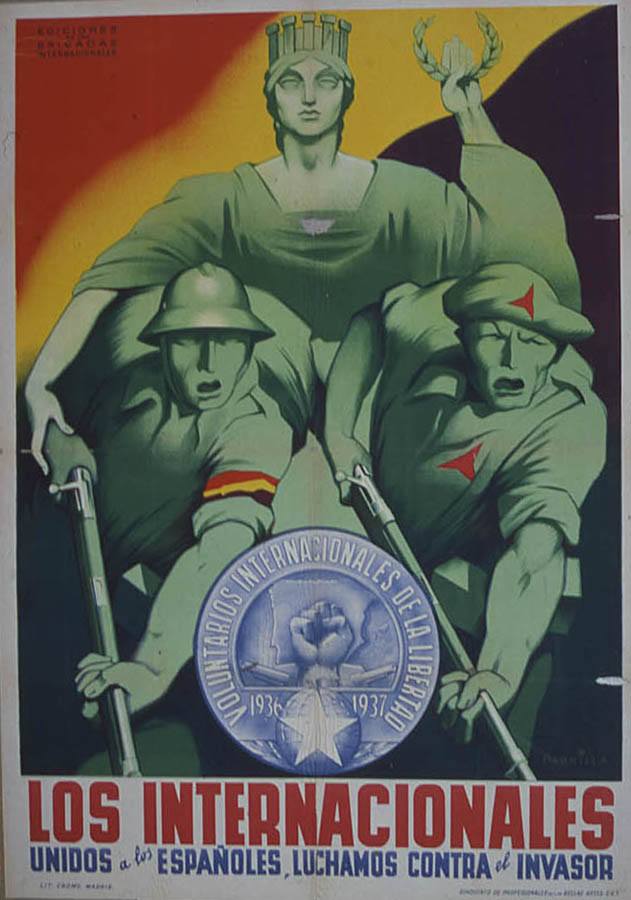A former militant of the reconstituted Spanish Communist Party (PCEr), a founding member of GRAPO, a Maoist movement, a resistance fighter and a terrorist, during the last years of Franco’s dictatorship, who retired from all political activity, as a democrat and liberal more than forty years ago, Pío Moa has become one of the most famous authors of his country. Ignored in France, he is at the center of all controversies and is a cultural phenomenon in Spain, where his books are bestsellers. His honest and disinterested effort to reinterpret the history of the Second Spanish Republic, the origins, developments and consequences of the Spanish Civil War, particularly from the archives of the Pablo Iglesias Socialist Foundation, is the most successful of the last twenty years.
His remarkable work of synthesis, Los Mitos de la Guerra civil (The Myths of the Spanish War 1936-1939), sold more than 300,000 copies, in Spain and in Spanish-speaking countries, and which he has just republished in an updated and completed version with Editions L’Artilleur (March 2022). We interviewed the author, Pío Moa, on the occasion of the French publication of this book-event, with historian Arnaud Imatz.
Arnaud Imatz (A.I.): The Spanish Civil War (SCW) or the Spanish War, as it is called in France, is one of the privileged places of lies. It has been repeated ad nauseam that it was the consequence of Franco’s harmful action; or, to put it more “cleverly,” the result of the aggression of the Army, the Catholic Church and the Bank against the People, Democracy and the Republic. In your work and research, you demonstrate that it was, on the contrary, the revolutionary movement and the collapse of the State and democracy that led to the July 1936 uprising. How did you come to this conclusion when you were an anti-Franco activist in your youth, a militant of the Marxist extreme left?
Pío Moa (P.M.): Paradoxical as it may seem, Franco was the last to rebel against the republic. Before him, socialists, anarchists, left-wing republicans (starting with the president of the council of ministers, Manuel Azaña), Catalan and Basque separatists, and the right-wing soldier José Sanjurjo had done so. The president of the republic Alcalá-Zamora, a moderate right-wing politician, also sabotaged right-wing politics because of his inferiority complex. Nothing is more false than the refrain “the people against the Church, etc.” The people voted massively to the right in November 1933. And it was then that the left decided to launch an armed insurrection. When I was young, I was a Marxist. I considered the errors and crimes that were being displayed before everyone’s eyes as temporary consequences of a great historical ordeal, which could not be perfect, and which would be overcome. Studying the contradictions of Marxism, especially from the theory of the fall of the rate of profit, I concluded that from fundamental errors in the theoretical conception one could only lead to errors and criminal practices, and that these were not accidental or the product of inexperience.

A.I.: Why do you give so much importance to the attempted socialist revolution of 1934 in the origins and direct history of the SCW?
P.M.: The Socialist and Catalan separatist revolution of October 1934 was openly and explicitly presented as a civil war aimed at destroying the “bourgeois” republic, imposing a communist republic and, if necessary, the secession of Catalonia. This is absolutely documented, which is why there has been an enormous effort to conceal it on the part of a generalized propagandist historiography, but without any rigor or serious value.
A.I.: Was there a fascist danger in Spain in the 1930s?
P.M.: There was no fascist danger. The leaders of the PSOE, Largo Caballero and his intellectual mentor Luis Araquistáin, said so themselves. They said it outside Spain. Inside, they insisted on its danger to mobilize people. This was part of their preparation for the Civil War.
A.I.: How did Republican legality and democratic coexistence definitively collapse in 1936?
P.M.: The left could have been moderate after learning the lessons of their failure in the 1934 insurrection. But the opposite happened. They approached the February 1936 elections by openly announcing that they would not recognize a victory for the right. These elections could not therefore be normal. And they were falsified, as recent very concrete studies have shown. This falsification was a real coup d’état that opened a period of complete rupture of republican legality.
A.I.: In your opinion, who are the main political figures responsible for the Civil War?
P.M.: Paradoxically, the main person responsible was the president of the republic, Niceto Alcalá-Zamora, a man of the right. In 1933 the left-wing parties and the separatists were defeated at the ballot box, and in 1934 they were defeated again in their armed rebellion. The PSOE and the separatists should then have been outlawed until they had learned their lesson. Alcalá-Zamora tried, on the one hand, to block any effective action and, on the other, to bring down those who won the elections and defeated the insurrection. Why did he do this? Mainly because of the typical complex of the right-wing politician who wants to pass for a “progressive” and thus curry favor with the left. After him, the main culprits were the socialist leader Francisco Largo Caballero and the Catalan separatist Lluís Companys.
A.I.: Did the great political formations of the Popular Front accept liberal democracy and reformism, or did they rather seek to establish a form of “popular democracy,” a collectivist system or even a “dictatorship of the proletariat?” And were there really democrats in the Spain of 1935-1936?
P.M.: The radical party of Alejandro Lerroux was democratic, although corrupt. The CEDA (Spanish Confederation of Autonomous Rights) was not, but it accepted republican legality. The left-wing parties saw the republic as a means of imposing a “proletarian” dictatorship, i.e., their own; and the separatists saw it as a means of achieving secession. That is why, when they lost the elections in 1933, they turned to open rebellion.
A.I.: In France, the International Brigades are always more or less described as a movement of volunteers who went to defend democracy in Spain. Jacques Chirac said this in 2002, during a tribute to Colonel Rol-Tanguy, ex-brigadist and communist militant. Can you explain to us what the International Brigades were? Why is their image, often idyllic in the West, generally sinister and repulsive in Eastern countries?
P.M.: The International Brigades were a parallel army mobilized by the Comintern. They are obviously very well regarded by those who have a communist or similar mindset. Of course, the people of Eastern Europe know very well where the so-called communist romanticism leads; they are not fooled, like our “progressives.”
A.I.: Why was the Popular Front defeated?
P.M.: The only serious force within the Popular Front (which was essentially an alliance of pro-soviets and separatists), was the communists. They had a real strategy and the direct support of Stalin. They quickly realized that a regular, disciplined army was needed, not a more or less “folk militia.” The truth is that the rest of the Popular Front was composed of disparate and motley groups, very prone, especially in the case of the socialists, to theft and rearguard chekas. (For those who do not know, the chekas, named after the Soviet Cheka, were the torture centers—more than 400—organized by the various left-wing parties in all major cities). The Communists had to face the stupidity of their allies, and the crimes they committed raised great resentment among them. In fact, these allies, such as Azaña, sabotaged the communists’ actions as much as they could.
A.I.: The Marxist historian Manuel Tuñon de Lara was for a long time the admired and respected icon of French Hispanists, while at the same time one of the greatest international specialists. The American historian Stanley Payne was the victim of an incredible omerta of more than forty years in France (an omerta that was only broken in 2010 with the publication of La guerre d’Espagne. L’histoire face à la confusion mémorielle (Éditions du Cerf). Why is the perception of the Spanish War still so overwhelmingly favorable to the Popular Front in French academic and journalistic circles?
P.M.: Tuñón de Lara was clearly a Stalinist historian. The sympathy for the Communists in France is explicable. First, the Resistance had been largely Communist and their imposing propaganda made it possible to believe that they had been almost the only ones to resist. Secondly, it was the USSR that really defeated Nazism, at an immense cost. Finally, the French were lucky enough not to experience the delights of communism. That is why many can still afford the luxury of admiring Stalinist communism, of which Tuñón is a model.
A.I.: The greatest massacre of the Civil War was carried out for essentially religious reasons. 20% of the clergy, almost 7000 religious men and women were murdered. Between 1987 and 2020, various popes beatified no less than 1916 martyrs of the faith and even canonized 11 of them. But during the SCW, authors who claimed to be Christian humanists, such as Bernanos, Mauriac, Maritain or Mounier, severely criticized the exactions committed in the national camp and more or less directly supported the Popular Front camp.. How do you explain this?
P.M.: Within the Church, there was a current of sympathy towards communism, which culminated in the Second Vatican Council, with certain “dialogues between Christians and Marxists” that were very harmful to the Church. I think there was also a French nationalist sentiment, during the Spanish War. Franco was helped by Germany and Italy, and many believed that Spain would become one of their satellites, which did not happen. On the other hand, the Popular Front was indeed a satellite of Stalin.
A.I.: In Spain, the arrival of a new generation of historians and journalists at the turn of the 21st century has been accompanied by a terrible resurgence of hatred and sectarianism. You yourself have been insulted, mocked, slandered, pilloried, but also, and at the same time, applauded and praised by many readers and a host of scholars. Why this new political and cultural tension?
P.M.: After the Spanish people accepted democracy and the passage of “law to law” in a referendum, that is, respect for the historical legitimacy of Franco’s regime, the opposition, which was still that of the separatist leftists, embarked on a campaign to falsify history. Their vision seemed to prevail at the end of the 20th century, because it was accepted by an intellectually very poor right. But suddenly, it was documented and decisively refuted, and the socialist and extremist lefts reacted as usual—to the point of taking refuge in a typically totalitarian “historical memory law” that threatens the freedoms of research, expression and teaching. In so doing, their political leaders clearly show what kind of democrats they are and, incidentally, how weak and fragile their history is.
A.I.: The Spanish authorities seem obsessed with passing and strengthening these memorial laws, which only stir up division, unrest, resentment and hatred. Is it so difficult to accept the idea of a collective fault without discrimination between “good and bad” as a necessary condition for an authentic reconciliation?
P. M.: Yes! These laws feed resentment and division because they are based on enormous lies. To defend them, there are certain parties, most of them corrupt, and an extraordinarily uneducated and almost childish journalism in its manipulations. The historical reality is that Franco defeated a very serious Soviet and separatist threat, maintaining national unity and Hispanic culture. He overcame a murderous international isolation that sought to starve the Spanish people, and he left a prosperous, moderate and reconciled country. If it is true that “the truth will set us free,” it must be defended above all else.
Featured image: Poster for the International Brigades, ca. 1936.
